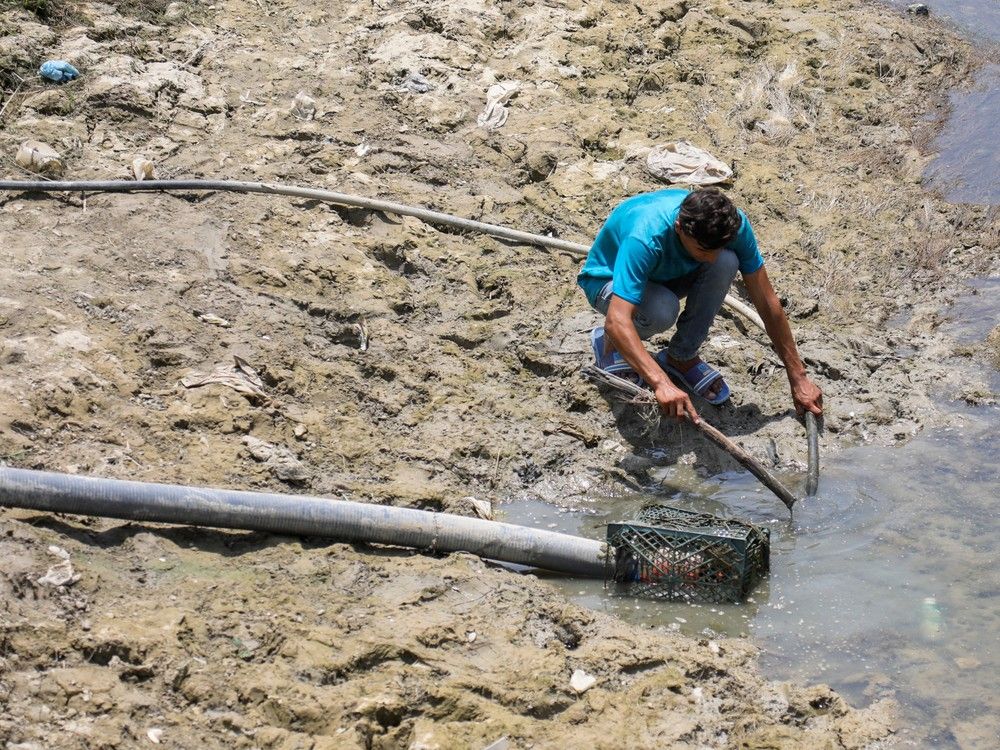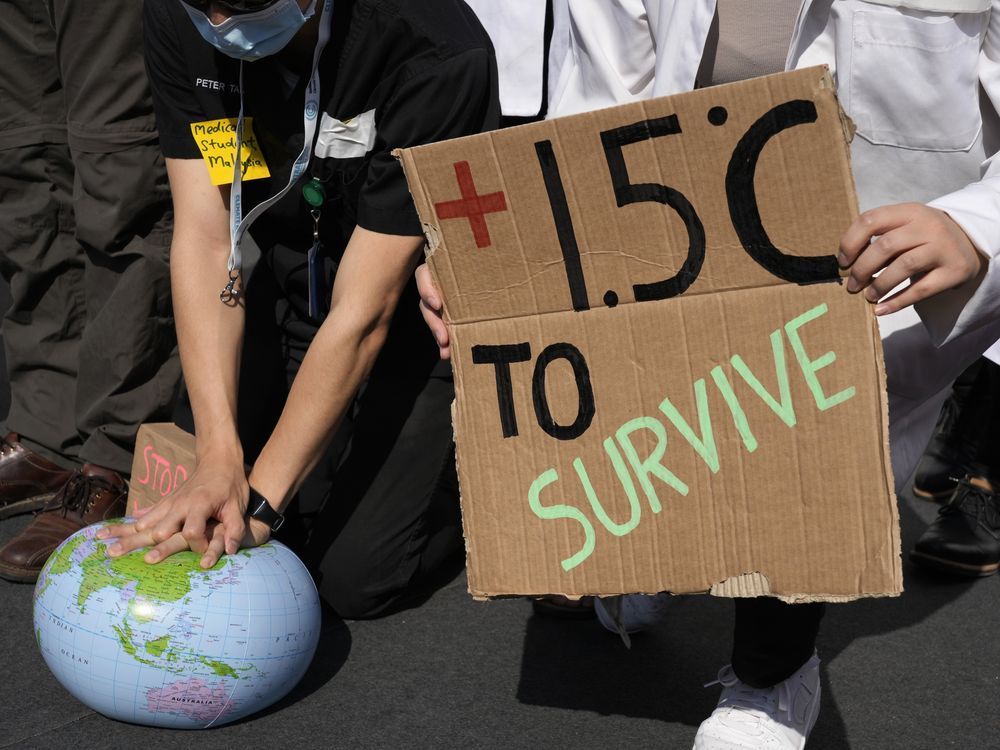
Here’s the latest news concerning climate change and biodiversity loss in B.C. and around the world, from the steps leaders are taking to address the problems, to all the up-to-date science.
Check back every Saturday for more climate and environmental news or sign up for our Climate Connected newsletter HERE.
In climate news this week:
• UN’s top court says failing to protect planet from climate change could violate international law
• ‘We have to improve or we’ll die’: B.C. ranchers seek water solutions in long drought
• EU and China pledge climate leadership role as U.S. retreats
Human activities like burning fossil fuels and farming livestock are the main drivers of climate change, according to the UN’s intergovernmental panel on climate change. This causes heat-trapping greenhouse gas levels in Earth’s atmosphere, increasing the planet’s surface temperature.
The panel, which is made up of scientists from around the world, including researchers from B.C., has warned for decades that wildfires and severe weather, such as the province’s deadly heat dome and catastrophic flooding in 2021, would become more frequent and intense because of the climate emergency. It has issued a code red for humanity and warns the window to limit warming to 1.5 C above pre-industrial times is closing.
According to NASA climate scientists, human activities have raised the atmosphere’s carbon dioxide content by 50 per cent in less than 200 years, and “there is unequivocal evidence that Earth is warming at an unprecedented rate.”
As of July 14, carbon dioxide in the atmosphere was 429.61 ppm, slightly down from 430.51 ppm last month, according to NOAA data measured at the Mauna Loa Observatory, a global atmosphere monitoring lab in Hawaii. The NOAA notes there has been a steady rise in CO2 from under 320 ppm in 1960.

Climate change quick facts:
• The Earth is now about 1.3 C warmer than it was in the 1800s.
• 2024 was hottest year on record globally, beating the record in 2023.
• The global average temperature in 2023 reached 1.48 C higher than the pre-industrial average, according to the EU’s Copernicus Climate Change Service. In 2024, it breached the 1.5 C threshold at 1.55 C.
• The past 10 years (2015-2024) are the 10 warmest on record.
• Human activities have raised atmospheric concentrations of CO2 by nearly 49 per cent above pre-industrial levels starting in 1850.
• The world is not on track to meet the Paris Agreement target to keep global temperature from exceeding 1.5 C above pre-industrial levels, the upper limit to avoid the worst fallout from climate change including sea level rise, and more intense drought, heat waves and wildfires.
• On the current path of carbon dioxide emissions, the temperature could increase by as much 3.6 C this century, according to the IPCC.
• In June 2025, global concentrations of carbon dioxide exceeded 430 parts per million, a record high.
• Emissions must drop 7.6 per cent per year from 2020 to 2030 to keep temperatures from exceeding 1.5 C and 2.7 per cent per year to stay below 2 C.
• There is global scientific consensus that the climate is warming and that humans are the cause.
(Sources: United Nations IPCC, World Meteorological Organization, UNEP, NASA, climatedata.ca)
Latest News

UN’s top court says failing to protect planet from climate change could violate international law
The United Nations’ top court in a landmark advisory opinion Wednesday said countries could be in violation of international law if they fail to take measures to protect the planet from climate change, and nations harmed by its effects could be entitled to reparations.
Advocates immediately cheered the International Court of Justice opinion on nations’ obligations to tackle climate change and the consequences they may face if they don’t.
“Failure of a state to take appropriate action to protect the climate system … may constitute an internationally wrongful act,” court President Yuji Iwasawa said during the hearing. He called the climate crisis “an existential problem of planetary proportions that imperils all forms of life and the very health of our planet.”
The non-binding opinion, backed unanimously by the court’s 15 judges, was hailed as a turning point in international climate law.
Notably, the court said a “clean, healthy and sustainable environment” is a human right. That paves the way for other legal actions, including states returning to the International Court of Justice to hold each other to account as well as domestic lawsuits, along with legal instruments like investment agreements.
—The Associated Press

EU and China pledge climate leadership role as U.S. retreats
The European Union and China committed to leading the world in the fight against climate change in a symbolic show of unity as the US steps back under President Donald Trump.
Brussels and Beijing will deliver updated climate plans for 2035 that are in line with the long-term temperature goal of the Paris Agreement, ahead of the United Nations’ COP30 summit in Brazil later this year, according to a joint statement on Thursday. They’ll also boost co-operation in areas such as the energy transition and tackling methane emissions.
“The two sides agree to demonstrate leadership together to drive a global just transition in the context of sustainable development and poverty eradication,” said the statement. Bloomberg previously reported its content.
While lacking in specific commitments on how emissions will be reduced and by how much, the statement is still a crucial show of unity in the face of disagreement on a number of other issues, such as trade and relations with Russia. The declaration is the only deliverable expected from a summit marking 50 years of EU-China diplomatic ties.
—Bloomberg News
How climate change is raising your grocery bill
A 300 per cent spike in Australian lettuce prices. A 50 per cent rise for European olive oil and 80 per cent for U.S. vegetables. Researchers from the Barcelona Supercomputing Center and the European Central Bank have traced back those price jumps to extreme weather they say is linked to climate change.
The group analyzed 16 weather events around the world between 2022 and 2024. Many were so unusual that a given region had experienced nothing like it prior to 2020, according to the analysis, which was published in the peer-reviewed journal Environmental Research Letters on Monday in Europe.
“Unprecedented conditions are set to become increasingly common across the world,” the study’s authors say. “At the same time, new records for extreme conditions will continue to be set, further from those to which agricultural production and economic systems are currently adapted.”
Climate change brings with it higher temperatures and extreme rains, which can lower yields and make the crops that are harvested more expensive. British households’ food bill, for instance, was £361 (about $484) more in 2022 and 2023 due to climate change, according to estimates by the non-profit Energy and Climate Intelligence Unit.
Consumers globally say they are feeling the effects of climate change on their grocery bills, making food unaffordable for some and posing a challenge for central bankers trying to tame inflation.
—Bloomberg News

‘We have to improve or we’ll die:’ B.C. ranchers seek water solutions in long drought
Rancher John Parkes wants more water storage in B.C.’s Interior, which is suffering the impacts of a multi-year drought.
But Parkes, manager of the Nicola Ranch near Merritt, says it’s not just for irrigation — water from dams is released into drying rivers to maintain flows and river ecosystems.
“My predecessors, over the last 100 years, built plenty of upland water storage for irrigation. What we need right now is we need water storage for conservation use, for fish flows.”
Ranchers in B.C.’s Interior say they have asked the province to consider reducing red tape around building and expanding water-storage dams to help them cope with the continuing drought.
Parkes said ranchers in the area have already been working with First Nations to control water use to make sure there’s enough for both agriculture and conservation.
“I would say that before we’re cattle ranchers, we’re stewards,” Parkes said. “We value it because we know that’s how we survive. Why aren’t groups looking at building more ecological water storage for environmental values?”
—The Canadian Press
Australia’s growing algal crisis in South devastates marine life
Australia’s government has unveiled an assistance package of at least A$14 million ($9.1 million) to help tackle a growing algal bloom crisis off the southern coast that’s killing marine life and damaging regional fisheries.
Environment Minister Murray Watt announced the funding package in the southern city of Adelaide on Monday after inspecting the damage. He described the unfolding natural disaster as “a very serious event.”
The outbreak of the algal bloom in South Australia state was sparked by the karenia mikimotoi plankton and first detected in mid-March. Since then, it has spread across thousands of square kilometres into waterways near Adelaide.
It has now developed into an event of “unprecedented scale, duration and impact,” the state government said. “Nothing can be done to dilute or dissipate the bloom.”
Watt said the federal funding was intended to help clear dead wildlife and provide assistance for tourism and fisheries, as well as longer-term prevention measures. “There’s clearly a need to invest more in science and research about this event,” he said.
—Bloomberg News

London Underground is broiling commuters as city calls workers back five days a week
A quiet threat to London’s position as a bustling world financial centre is starting to show on the sweaty white collars of the city’s commuters.
The ride on the deepest lines in London’s Underground system, always something of a chore, is becoming closer to unbearable for travellers to the city’s main deal-making district. Financial workers this summer are being asked to return to the office up to five days a week at a time when soaring temperatures are making many non air-conditioned transport links in London feel woefully unprepared for climate change.
“It hurts the idea of going into the office, because you’ll be sweating no matter what you’re wearing,” said Tom Mulinder, who works in construction finance and commutes to the City of London from the suburbs in Surrey, some 48 kilometres away.
After registering the hottest June on record, England experienced three heat waves before the end of July. Below ground, however, weekday commuters have been facing the equivalent of non-stop heat wave conditions all summer, data recorded by Bloomberg News show.
Temperatures inside the crowded carriages are several degrees hotter than the surface, according to Bloomberg’s London Tube Heat Index, which, since June 23, has been tracking temperatures on the Central line from Bank station in the financial district to Bond Street in the posh Mayfair neighbourhood. The journey covers about 10 minutes a little before 4 p.m. each day.
—Bloomberg News